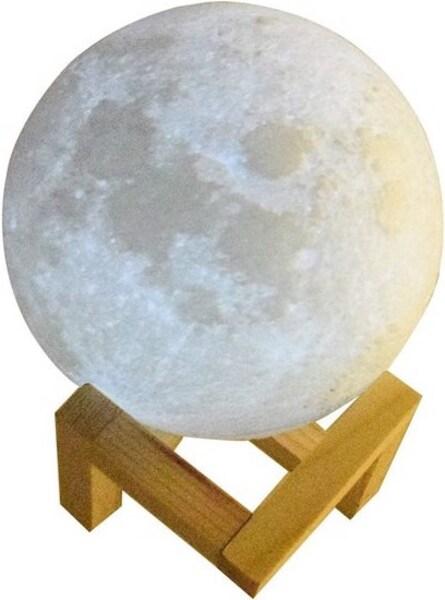

Fact Check: do you really sleep worse when there’s a full moon?
On the night of 30-31 August, there’ll be a full moon. In fact, it’ll be the biggest this year. If you’re anticipating a long, restless night, you might be interested in what sleep researcher Christian Cajochen has to say in this instalment of Fact Check.
Turning over. Then again. And again. Counting to 100. Counting to 100 in French. Throwing in the towel at 17. Sighing irritably. Maybe nights like these sound familiar to you. You might even feel like you sleep particularly badly during a full moon. But is that really the case? Or are you only sleeping badly because you’re expecting to? I asked Christian Cajochen, sleep researcher and Head of the Centre for Chronobiology at Basel University’s psychiatric clinic.
Christian Cajochen, if you had to answer the question of whether the full moon affects sleep in one sentence, what would you say?
Yes, but only slightly.
In 2013, you published a study on this that attracted a lot of international attention.
That’s right. We evaluated past data from the sleep laboratory at the Centre for Chronobiology. The test participants had been at the lab for a different study. None of them knew at that point that the effect the full moon had on their sleep would be studied later on. So they weren’t influenced in any way.
What was the result?
We found that during the full moon, the participants took five minutes longer to fall asleep, their deep sleep phase was 30 minutes shorter and their total sleep duration was reduced by 20 minutes. Their melatonin levels (the hormone that controls our day-night rhythm) were also lower than during other moon phases.
How do you explain that?
That’s exactly what’s so tricky. We don’t have a definitive explanation. The most obvious one – that the light emitted by a full moon is about ten times brighter – can’t be right. The participants had spent the night in absolute darkness, in windowless, underground bedrooms. Plus, the impact of the moon’s gravitational pull has only ever been proven in relation to larger «bodies» such as lakes or seas – but not on humans. One explanation might be inner circalunar clocks.
What are they?
Nerve cells which have been proven in certain animals to contain a so-called lunar clock, which influences the daily rhythm of sleep- and waking phases. In the animal kingdom, this is mainly important for breeding. Bristle worms, for instance, only mate during certain moon phases. That doesn’t even change if the worms are kept in a dark laboratory for months.
Do humans have circalunar clocks too?
They haven’t been discovered in humans yet. As I mentioned before, our lab-based studies revealed that the full moon has a clear impact on sleep. However, we don’t have any definitive explanation for it.
We found that during the full moon, the participants took five minutes longer to fall asleep, their deep sleep phase was 30 minutes shorter and their total sleep duration was reduced by 20 minutes.
Your 2013 study was criticised because it only examined the sleep of 33 people. Was that justified?
Although the number was at the lower limit, it was scientifically significant. We determined this statistically using a sample size calculation. The study was very tightly controlled and involved a lot of effort from the participants. We couldn’t have done it with thousands of people.
The examination period at your laboratory – five days – was also considered too short. What’s your view on that?
We always chose to evaulate the third night (Tuesday) so that we could rule out the impact of the weekend on sleep. This delivered more meaningful results than having more participants from a larger pool of test subjects come in on random days of the week.
Are scientists still as critical of your study as they used to be?
Things have improved in that regard. The moon still has a pretty bad reputation in the scientific community. There’s big business around it – say, with lunar calendars – and it’s often pushed into the esoteric corner. Scientists don’t want to be associated with that. For chronobiologists, on the other hand, the moon is no longer taboo. And more and more new studies are confirming our 2013 results, too.
Are you talking about the the 2021 study done in Washington?
Yes. Researchers studied the sleep of Seattle students and indigenous people from South America in the days leading up to the full moon. Both groups experienced worse sleep. The effect was strongest among indigenous communities still living without electric light. Though not as pronounced among the students, the effect was still detectable. Researchers suspected that the young people had spent more time outside during the full moon. Again, however, they couldn’t come up with a definitive cause.
Let’s not scapegoat the moon. It alone isn’t enough to negatively impact sleep.
Are you still convinced that the moon could influence sleep?
Yes. In fact, I’m even more convinced than I was ten years ago. In a survey we’ve been running at the University of Basel since 2014, the moon is also consistently ranked among the top three environmental factors that influence the Swiss population’s sleep. The psychological aspect obviously plays an essential role, too: if you think you’re not going to sleep well, you won’t. But that alone doesn’t explain everything.
How well do you sleep when there’s a full moon?
I always assumed that I sleep how I always do. Then, when I wore a Fitbit watch over a few years and evaluated the data, I got a surprise. I hadn’t noticed any difference myself, but I really did sleep marginally worse during a full moon. At least according to the Fitbit.
What advice do you have for people who can’t sleep during a full moon?
Let’s not scapegoat the moon. It alone isn’t enough to negatively impact sleep. Our decades of research show that 90 per cent of the time, stress and repetitive thoughts cause poor sleep. So I don’t have any sleep advice concerning the full moon specifically. I do have some general sleep hygiene tips, though:
- Go to bed and get up in the morning at the same time every day to align your body’s biological rhythms.
- Don’t eat any large meals in the three hours before you go to bed. However, don’t go to bed hungry.
- Stop drinking alcohol three hours before bedtime, and don’t drink caffeinated beverages in the 4-8 hours before bedtime.
- If you’re having an afternoon nap, don’t sleep for longer than 30 minutes. If you do, you’ll have less urge to sleep as night falls.
- Don’t stay in bed longer than necessary. Sleep disorders can be exacerbated by lounging around for too long.
- Don’t smoke after 7 p.m.
- Avoid doing overly strenuous physical activity after 6 p.m.
- Make your bedroom comfortable and conducive to sleep.
- Create a buffer zone between everyday life and bedtime.
- Avoid bright light (for example, from phone- or TV screens) before bedtime, but also when you wake up during the night. This is because the light can alter your body clock.
How well do you sleep when there’s a full moon? What tricks do you use to help you fall asleep? I’m looking forward to reading your tips and experiences in the comments.
Header image: Shutterstock/Athapet Piruksa
I love anything with four legs or roots - especially my shelter cats Jasper and Joy and my collection of succulents. My favourite things to do are stalking around with police dogs and cat coiffeurs on reportages or letting sensitive stories flourish in garden brockis and Japanese gardens.
Interesting facts about products, behind-the-scenes looks at manufacturers and deep-dives on interesting people.
Show allThese articles might also interest you

Background information
«Data from wearables means you can skip the sleep clinic»
by Martin Jungfer

Background information
5 plus 8 = good night? With this simple formula, babies are supposed to fall asleep quickly
by Katja Fischer

Background information
Melatonin gummy bears for kids: miracle or menace?
by Katja Fischer

